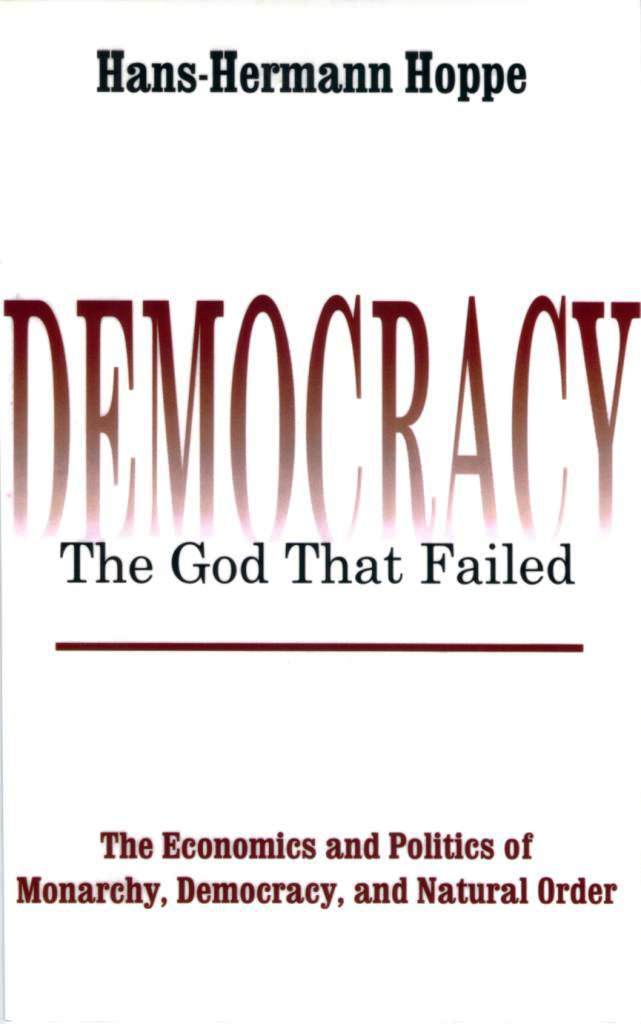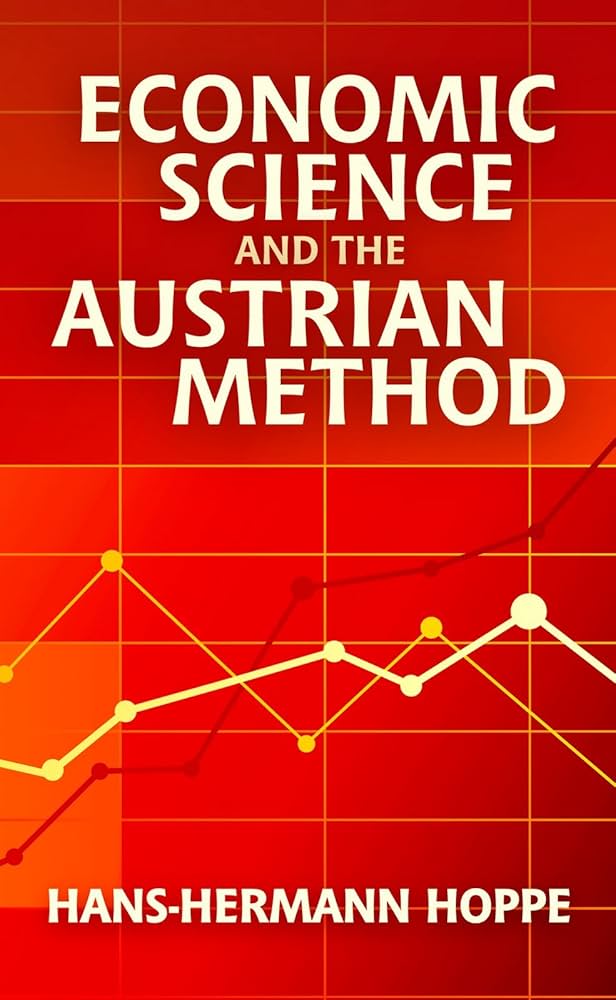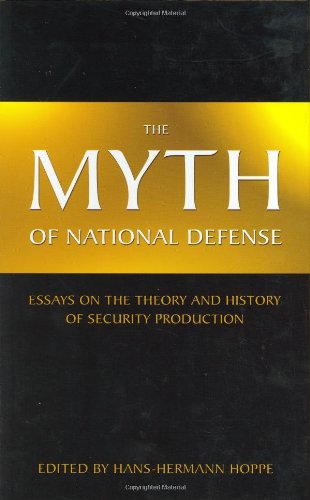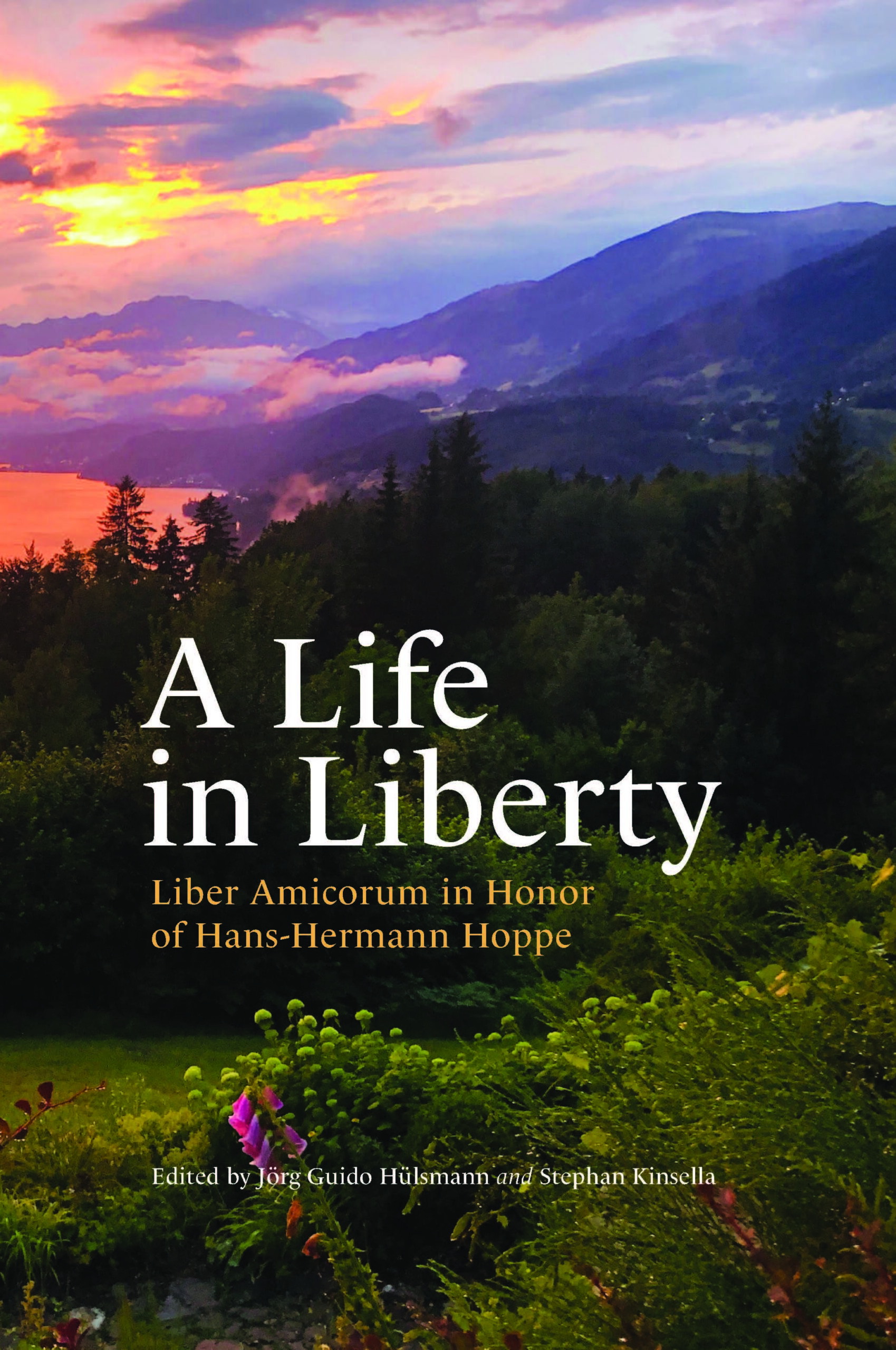Professor Hoppe’s Economic Science and the Austrian Method has been translated into Chinese by Hongchao Tan.
From the Authors Forum, presented at the Austrian Economics Research Conference 2013 (formerly ASC) (21 March 2013, Ludwig von Mises Institute in Auburn, Alabama).
 Professor Hoppe’s A Theory of Socialism and Capitalism has been translated into Portugese (Mises Brazil, 2013; translated by Bruno Garschagen). It is available for free download into PDF and kindle (.mobi) formats. [Rothbard Brasil link]
Professor Hoppe’s A Theory of Socialism and Capitalism has been translated into Portugese (Mises Brazil, 2013; translated by Bruno Garschagen). It is available for free download into PDF and kindle (.mobi) formats. [Rothbard Brasil link]
Information on the new Laissez Faire Books edition of TSC may be found here. Professor Hoppe’s work now appears in at least 23 languages in addition to English.
From LewRockwell.com, a transcript of Hoppe’s speech The Economics of World Government (The Lew Rockwell Show #130, 18 Aug. 2009) (from Mises University 2009).
The Economics of World Government
A transcript of the Lew Rockwell Show episode 130 of Hans-Hermann Hoppe at the 2009 Mises University talking about the economics of political centralization
Recently by Hans-Hermann Hoppe: On the Impossibility of Limited Government and the Prospects for a Second American Revolution
ANNOUNCER: This is the Lew Rockwell Show.
ROCKWELL: Recently, at the 2009 Mises University, Professor Hans-Hermann Hoppe talked about the economics of political centralization. What is it that brings about unification, unfortunate unification and centralization within a country like the United States where the states gradually become irrelevant under an all-powerful D.C., and, for that matter, drives countries to join together into an even worse situation, of course, a world government?
Here’s Dr. Hoppe.
HOPPE: OK, I will begin my lecture.
At the beginning, I want to repeat a few points that I have made in my previous lecture on law and economics, and then I want to get to an entirely different subject than the one that I dealt with in that previous lecture.
Because there is a scarcity in the world, we can have conflicts regarding these scarce resources. And because conflicts can exist whenever and wherever there exists scarcity, we do need norms to regulate human life. Norms – the purpose of norms is to avoid conflicts. And in order to avoid conflicts regarding scarce resources, we need rules of exclusive ownership of such scarce resources or, to say exactly the same, we need property rights to determine who is entitled to control what and who is not entitled to control what.
These rules, I have defended in my previous lecture, the rules that Austrians regard as rules capable of doing this, avoiding conflict and, at the same time, being just rules are the following. One is every person owns himself, his own physical body. He has exclusive control over his own physical body. The second rule refers to, how do we acquire property, the right of exclusive control of scarce resources outside of our body in the external world. Previously – initially, the outside world is un-owned and we acquire property in objects outside of our body by being the first one to put certain resources to use and, thereby, we become the owner. This is also sometimes referred to as original appropriation or as homesteading. Rule number three and four are implied in the previous two. He who uses his physical body and those things that he originally appropriates in order to produce something, to transform things into a more valuable state of affairs, thereby, becomes the owner of what he has produced. Producer owns the product. And finally, we can also acquire property by a voluntary transfer from a previous owner to a later owner.
In addition, you also realize that if you would follow these rules, by and large, wealth will be maximized. And if we follow these rules, then all conflicts can conceivably be avoided.We again only emphasize in this lecture that there are intuitively sensible rules, who should own us unless – who should own us, except ourselves. Somebody else should own us sounds absurd. Should the second one be the owner who has done nothing to a resource, instead of the first one? Again, that sounds absurd. The producer does not own the product, but somebody who has not produced it should own the product? Again, that sounds absurd. And obviously, rule number four, if it would be possible to just to take something away from other people against their consent, civilization would be destroyed in a moment’s time. [continue reading…]
 A new version of Professor Hoppe’s A Theory of Socialism and Capitalism has recently been published by Laissez Faire Books. Earlier editions of the book may be found here. The book is free in epub and kindle (mobi) format for members of the Laissez Faire Club (members also gain free access to dozens of other e-books in the members-only library). More information about the club.
A new version of Professor Hoppe’s A Theory of Socialism and Capitalism has recently been published by Laissez Faire Books. Earlier editions of the book may be found here. The book is free in epub and kindle (mobi) format for members of the Laissez Faire Club (members also gain free access to dozens of other e-books in the members-only library). More information about the club.
[Update: here are the epub and mobi files]
I wrote a Foreword, which may be found here. Jeffrey Tucker also wrote a useful Editorial Preface that draws attention to the insights in the book that the reader might otherwise miss. His preface may also be found here.
Below is the email message sent to Laissez Faire Club Members by Jeff Tucker in announcing the publication of the book:
Jeffrey Tucker The usual model of politics that most everyone uses today makes no sense. Hans-Hermann Hoppe’s A Theory of Socialism and Capitalism utterly smashes intellectual conventions and makes a case for an alternative way of classifying political and economic systems.
This book was Hans-Hermann Hoppe’s first treatise in English and the one that put him on the map as a social thinker and economist to watch. This new edition includes a detailed analysis by one of his leading students and interpreters, N. Stephan Kinsella. Also, the editorial preface, written by yours truly, draws attention to the insights in the book that the reader might otherwise miss.
Hoppe argues that there are only two possible poles in economic affairs: socialism (violation of private property) and capitalism (respect for private property). All systems are combinations of those two types. The capitalist model he defines as pure protection of private property, free association, and exchange – no exceptions. All deviations from that ideal are species of socialism, with public ownership and interference with trade.
Within the structure of socialism, he distinguishes the left and right version. “Conservative”socialism favors high regulation, behavioral controls, protectionism, and nationalism. The “liberal” version tends more toward outright public ownership and redistribution. In addition, there is a technocratic version that intervenes based on expediency. The consequences of socialism vary based on their degree and kind, but they have similarities: high costs, resource waste, low growth, and economic stagnation.
This structure of the book is that of a comparative systems text, but it goes much further than that. What matters about this book most is the theory and the analytics that Hoppeuses to make the case. This is where we find the innovation. This is where the book shines. This is where the reader will find a more perfect form of a side of an argument that has been ongoing for hundreds if not thousands of years. The reason is Hoppe’s method. It is strictly logical, proceeding step-by-step through every thought, expanding and expanding relentlessly but never leaping from point-to-point in a way that skips or takes anything for granted.
It is through this method that Hoppe presents a thorough and compelling case for the existence and protection of private property, explaining in some detail the first condition of ownership: rivalrous use of physical resources.
His defense of self ownership is the first application of the philosophical rule against performative contradiction to issues of political economy. His case against technocratic regimes rests, implausibly, on an epistemological case for a special kind of cause and effect relationship that exists in human affairs over the natural sciences.
Even his understanding of Marxism is unique: he is careful to discard only the illogical and nonsensical parts while retaining the features that actually do make sense. It concludes with essays on the two most common objections to a fully privatized society.
This masterful book is the template for most of Hoppe’s contributions throughout his career, but here they are succinctly stated and very well organized.
[PFS]
Below is a recent post from Mises Deutschland with videos of Professor Hoppe speaking on “Privatrechtsgesellschaft statt Staat,” Modelhof Akademie (Nov. 23, 2012).
Vortrag von Professor Hoppe in der “Akademie Modelhof”: “Privatrechtsgesellschaft ohne Staat”
16.1.2013 – Am 23. November 2012 sprach Prof. Dr. Hans-Hermann Hoppe in der “Akademie Modelhof” (Müllheim, Kanton Thurgau, Schweiz) zum Thema “Privatrechtsgesellschaft ohne Staat”.
Prof. Hoppe zeigt in seinem Vortrag, dass der Wettbewerb in der heutigen Parteiendemokratie – ein Wettbewerb im Lügen und Abkassieren, im Täuschen und Tarnen – keine guten Ergebnisse hervorbringen kann.
Als Alternative bietet er die Privatrechtsgesellschaft an, aufgebaut auf Selbstbestimmung und Freiwilligkeit. In diesem System werden Konflikte neutral gelöst.
Prof. Hoppe zeigt auch auf, dass das Modell der Privatrechtsgesellschaft keine Utopie, sondern streng durchdacht, realistisch und genau betrachtet sogar selbstverständlich ist.
Wir bedanken uns bei der “Akademie Modelhof” für die Genehmigung zur Veröffentlichung der Videos.
Andreas Marquart
(Hinweis: es lässt sich leider nicht vermeiden, dass die Videos gleichzeitig starten, bitte ein Video einfach auf “Pause” stellen)
Hier können Sie die Diskussion im Anschluss an den Vortrag verfolgen: [continue reading…]
From LewRockwell.com:
The Anarcho-Capitalist Solution
Hans-Hermann Hoppe on the megalomaniacs called the State.Obsessed by Megalomania
Interview with Hans-Hermann Hoppe
Recently by Hans-Hermann Hoppe: Entrepreneurship With Fiat Property and Fiat Money
The following interview with Hans-Hermann Hoppe first appeared in the German weekly Junge Freiheit on November 2, 2012, and was conducted by Moritz Schwarz. It has been translated here into English by Robert Groezinger.
Are taxes nothing but protection money? The state a kind of mafia? Democracy a fraud? Philosopher Hans-Hermann Hoppe is not only considered one of the most prominent pioneering intellectuals of the libertarian movement, but also perhaps the sharpest critic of the Western political system.
Professor Hoppe: In your essay collection ‘Der Wettbewerb der Gauner’ (‘The Competition of Crooks’) you write that ‘99 percent of citizens, asked if the state was necessary, would answer yes.’ Me too! Why am I wrong?
Hoppe: All of us, from childhood, have been moulded by state or state licensed institutions – preschools, schools, universities. So the result you quoted is not surprising. However, if I asked you whether you said yes to an institution having the last word in each conflict, even in those it is itself involved in, you would certainly say no – unless you hoped to be in charge of this institution yourself.
Er … correct.
Hoppe: Of course, because you know that such an institution cannot only mediate in conflicts but also cause them, you can recognize that it can then resolve them to its own advantage. In the face of this I, for one, would live in fear of my life and property. However, it is precisely this, the ultimate power of judicial decision-making, that is the specific characteristic of the institution known as the state.
“Mülkiyet, Mukavele, Saldırganlık, Kapitalizm, Sosyalizm” and “Rus Tipi Sosyalizm” Turkish translations of “A Theory of Socialism and Capitalism” “Part 2:Property, Contract, Aggression, Capitalism, Socialism” and “Part: 3 Socialism Russian Style”
Interview radio de Hans-Hermann Hoppe à l’Australian Broadcasting Corporation (ABC), French translation of Radio Interview with Hans-Hermann Hoppe on Anarcho-capitalist libertarianism: What is it? Hoppe Radio Interview on Australian Broadcasting Corp.
Du conservatisme et du libertarianisme. Par Hans-Hermann Hoppe. French translation of chapter 10, “On conservatism and libertarianism” of Democracy The God that Failed.
From a PFS post:
Hans-Hermann Hoppe, “The Hayek Myth” (PFS 2012)
by STEPHAN KINSELLA on NOVEMBER 20, 2012
Hans Hoppe’s speech for the 2012 Annual Meeting is now available:
Hans Hermann Hoppe, “The Hayek Myth”, PFS 2012 from Property & Freedom Society on Vimeo.
Hoppe on “Ludwig von Mises und der Liberalismus” via Ludwig von Mises Intitut Deutschland
Lesen Sie nachfolgend die Einleitung und den Schluss von “Ludwig von Mises und der Liberalismus” von Hans-Hermann Hoppe aus dem Jahr 1993.
Den vollständigen Beitrag können Sie am Ende des Artikels herunterladen.
Interview with Professor Hoppe on the nature of the state and a private law society.
Interview mit Hans-Hermann Hoppe von dem Ludwig von Mises Institut Deutschland.
Herr Professor Hoppe, in Ihrer Aufsatzsammlung “Wettbewerb der Gauner” schreiben Sie, „99 Prozent der Bürger würden auf die Frage nach der Notwendigkeit des Staates mit ‚ja’ antworten“. Ich auch! Warum liege ich falsch?
Wir alle sind von Kind auf in staatlichen oder staatlich lizensierten Einrichtungen – Kindergärten, Schulen, Universitäten – geformt worden. Das zitierte Ergebnis ist also nicht überraschend. Aber wenn ich frage, ob Sie ‚ja’ zu einer Einrichtung sagen, die in allen Konfliktfällen einschließlich solcher in die sie selbst verwickelt ist das letzte Wort hat, so würden Sie dies sicher verneinen – es sei denn, Sie hofften selbst Inhaber dieser Institution zu sein.
Äh…richtig.
Natürlich, denn Sie wissen, dass eine derartige Einrichtung Konflikte nicht nur schlichten, sondern selbstverursachen kann, um sie dann zu ihren eigenen Gunsten zu entscheiden. Ich jedenfalls würde angesichts dessen um mein Leben und Eigentum fürchten. Doch genau dies: die letztrichterliche Entscheidungsgewalt, ist das characteristicum specificum der Institution Staat.
Interview mit Hans-Hermann Hoppe von dem Ludwig von Mises Institut Deutschland.
Professor Hoppe has an article up on Mises Institut Deutschland about the founding of that Institute (Oct. 23, 2012).
This interesting article, by Joakim Fagerström and Joakim Kampe, was posted today on LewRockwell.com
***
Hoppe’s Dangerous Books
by Joakim Fagerström and Joakim Kampe
A few months ago we were invited to speak at the European Students For Liberty regional conference in Stockholm. Our institute has previously written articles for ESFL and we have also delivered a webinar for them, on May 1st on the topic The Myth of the Socialist Paradise Sweden. It was a great event with about 200 attendees and it was, to our knowledge, greatly appreciated. Thus, we were truly looking forward to speaking at a one of their conferences that was going to be held in our hometown.
The topic of the speech was “How to achieve freedom”. In the speech we were going to bring up Mises and use him as a role model in the struggle for freedom, and how you had to be uncompromising in your struggle and never water down your message in order to better suit the masses. What mattered was devotion to truth and to your principles. After all, Mises in his memoirs concludes that if there was one thing that he regretted it was that he compromised too much (Memoirs, p. 60).
As a part of our attendance at the event we were planning on selling books from many of the great authors and legends like Ludwig von Mises, Murray Rothbard, Hans-Hermann Hoppe, Henry Hazlitt, Stephan Kinsella, Linda and Morris Tannehill and many more. Since these books are hard to get and a bit more expensive in Sweden we always try to sell them at good prices. We were granted the permission to have a table to sell the books from during the day. At this point everything was ok.
However, a few days before the event we announced at the ESFL event page that we were going to sell these books during the day and about ten minutes later we got a message from the organizers asking us to immediately remove the “Hoppe comment”. [continue reading…]
Prof. Hoppe will be speaking at the Modelhof on November 23, 2012.
Prof. Dr. Hans Hermann Hoppe, “Privatrechtsgesellschaft statt Staat”
From the PFS blog:
Sean Gabb: Libertarianism, Conservatism, And Immigration: The Hoppe Solution
OCTOBER 21, 2012
From Sean Gabb on VDare: Libertarianism, Conservatism, And Immigration: The Hoppe Solution By Sean Gabb on October 21, 2012 at 12:14am [See also John Derbyshire On Hans-Herman Hoppe—The Last Paleolibertarian] [Peter Brimelow writes: Alas, I had to miss the recent annual meeting of Hans-Herman Hoppe’s Property and Freedom Society in Bodrum, Turkey—for my thoughts on last year’s and earlier meetings, see here. The next meeting will be heldSeptember […]
From the PFS blog:
John Derbyshire On Hans-Herman Hoppe–The Last Paleolibertarian
By John Derbyshire on September 24, 2012 at 1:32amWhat a menagerie we have become, here on the political Right!
Neoconservatives we all know about. They are the guys who favor restraint in taxation and regulation while being supportive of free trade, the welfare state, globalization, and the World Policemanrole. Neoconservatives are currently basking in well-funded triumph, having taken over the Republican Party.
Paleoconservatives are still with us, or at least Pat Buchanan andChronicles magazine are. They preach restraint in foreign relations,traditional values, patriotism, and the Tariff.
Somewhere in between the two lie neo-reactionaries. I can’t quite get a handle on this term, but I have been seeing it with rising frequency this past few months. Is it really possible to have a category that includes both Jonah Goldberg and the weird but brilliant Mencius Moldbug? (I am a regular reader of MM, insofar as one can be a regular reader of a blogger who sometimes goes two months between posts.)
One percipient observer sees the beginnings of an entirely new kind of conservatism, distinct from all the foregoing: a “Dark Enlightenment,” of which I am (he says) one of the fuglemen, along with the aforementioned Mencius Moldbug.
Reposted from PFS:
Benjamin Marks: Westralian mining legend Ron Manners of Mannkal belongs in The Property and Freedom Society
by STEPHAN KINSELLA on OCTOBER 21, 2012
Westralian mining legend Ron Manners of Mannkal belongs in The Property and Freedom SocietyOther entries featuring Benjamin Marks» , Property and Freedom Society»by Benjamin Marks, Capitalism.HK and Economics.org.au editor
O fortunate age! O happy times! in which shall be made public my incomparable atchievements, worthy to be ingraved in brass, on marble sculptured, and in painting shewn, as great examples to futurity! and O! thou sage inchanter, whosoever thou may’st be, doom’d to record the wondrous story! forget not, I beseech thee, the trusty Property and Freedom Society, the firm companion of my various fate!
~ Don Quixote de la Mancha1Complying with Rothbard’s strict unanimity criterion, Turkey is the only modern day libertarian country. It is difficult for those who don’t speak a word of Turkish to comprehend the marvel, but I was able to get a good taste after interviewing scores of English-speakers in Turkey, all of whom were anarchocapitalist. This must be due to the diplomatic manoeuvrings and popular scheming of Turkey’s Property and Freedom Society (PFS), especially its annual meetings, with The Honourable Hans-Hermann Hoppe as host alongside his wife Gülçin as “the indispensable framework”. I was very fortunate that the 7th annual PFS meeting coincided with my recent visit to the southwest Turkish city of Bodrum.
Bodrum has so rich a history that it is even where “the father of history” Herodotus resided, and so, although I do not claim to be a professional historian, its history of historical awareness plausibly explains how it became the most libertarian country in the world today. The conference venue was the Hotel Karia Princess, which sounds like a cruise ship, and in the beginning of its history the evidence would indicate that it was a cruise ship that decided to stay put at the best location rather than travel to pick up passengers, or, more likely, to return them. The rooms were large enough for a modest harem. The food! The food was fit for a: libertarian. And the drinks! At 16 months since the last Property and Freedom Society meeting, it was a long time between drinks. And for Duncan of the U.K., Doolittle of the U.S. and De Roeck of Belgium, it looked like it was also a long time between meals. Evidently drinking like a fish has a different meaning to eating like a fish. It is very libertarian to think of progress as weight loss.
What I found most representative of PFS was a conversation I had involving the youthful Kinsella jnr. He is understandably so familiar with censoring his opinions that his father had to remind him that it is okay to speak his mind at PFS, which Hoppe proclaims a “political correctness free zone”. I think everyone struggled a little with this; jetlag was a non-issue compared with turning down our self-censorship settings. Many of us had forgotten where our self-censorship setting was, as we find it easier to just change the channel. I wonder if the popularity of sport can be explained as simply people finding somewhere where they are allowed to speak their mind and genuinely speak out in plain language against the opposition.
What I found fiercest was the very gentlemanly Karl-Peter Schwarz chastising Václav Klaus and Tyler Cowen for their opposition to returning land confiscated by governments to their rightful owners.
What I found funniest was Hoppe reading out the many functions of government that Hayek supported. Next time Hoppe delivers that speech there needs to be an intermission. But even without an intermission, or any time constraints of any sort since Hoppe wrote the schedule, even then! there was still only time for the speech to be just basically a list of where Hayek supported government.













